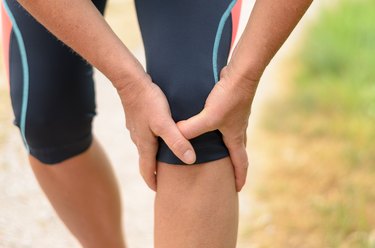
Several conditions can cause pain under and around your kneecap that worsens at night. Many result from overuse of your knee joint and surrounding muscles and tendons. Regardless of the cause, these symptoms can usually be treated at home. See a doctor if your pain persists or worsens.
Chondromalacia Patella
Video of the Day
This condition -- particularly common in adolescent girls -- occurs when your knee cartilage becomes so inflamed that it rubs against the back of your patella, causing pain behind and under the kneecap that often worsens at night, according to London Physio Centre. Treatment involves massage to reduce inflammation, gentle exercises and avoiding activities that can aggravate the condition, such as climbing stairs, playing high-impact sports and wearing high heels.
Video of the Day
Patellar Tendinitis
Patellar tendonitis affects the tendon that attaches to your kneecap and the tibia bone in your shin. When this tendon becomes inflamed, it causes pain under your kneecap, according to MayoClinic.com. This symptom can be quite sharp during high-impact activities -- such as running and jumping -- and becomes a dull, persistent ache at night. The condition is usually caused by knee-joint overuse and continuous pressure on your tendons, increasing your workouts' intensity too soon, or tight hamstrings that place extra stress on your lower legs and knees. Usually, patellar tendonitis can be treated with rest and avoiding aggravating activities, stretching your hamstrings and strapping your knee, according to MayoClinic.com. Massage and exercises to strengthen your quadriceps -- which support your knee -- also can help. If your symptoms persist, the knee is red and swollen or everyday movement is affected, see a doctor.
Growing Pains
This condition -- common in children between ages 3 and 5 and 8 and 12 -- is characterized by pain in the legs, including behind the knees, and is usually worse at night. While growing pains aren't believed to be caused by growing, the condition tends to subside once you have stopped growing -- hence the name, says KidsHealth. One theory is that pains occur at night because of muscle fatigue from the day's activity. There's usually no need for treatment, but pain-relief medication, stretching your legs during the day and applying a heat pack can help reduce symptoms.
Osteoarthritis
This condition's cause is degeneration of your joints' cartilage. Osteoarthritis -- which is particularly common in the knees -- is usually brought on by age, says Patient.co.uk. However, it can also occur if you are considerably overweight, had knee injuries or infections, or you have a family history of osteoarthritis. The first symptom you may experience is joint pain and stiffness in the morning and after exercise. In advanced cases, you may also have pain at night. There is no cure for osteoarthritis, but heat therapy and anti-inflammatory and pain-relief medications can help manage your symptoms. Wearing cushioning insoles in your shoes may also reduce pain when walking. Seek your doctor's advice before attempting these treatments.
Is this an emergency? If you are experiencing serious medical symptoms, please see the National Library of Medicine’s list of signs you need emergency medical attention or call 911.